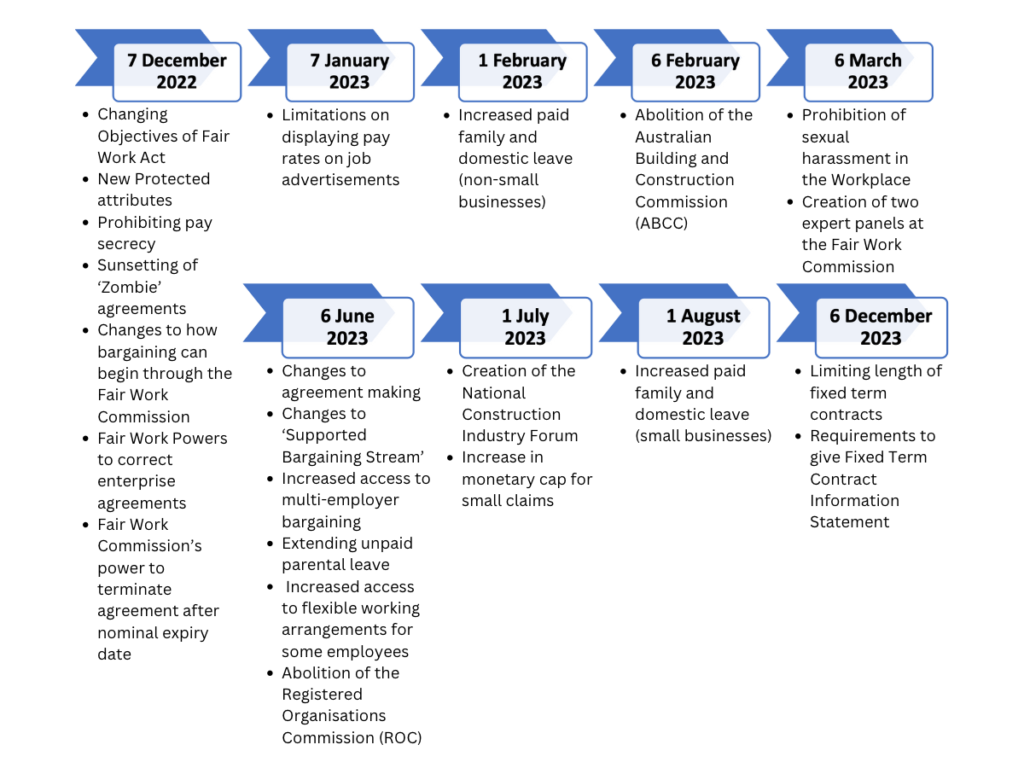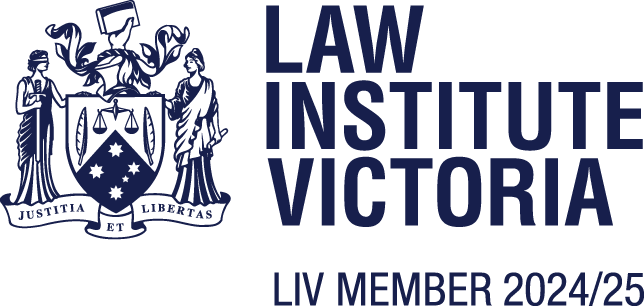With the recent change in Government comes another change to employment Law. On 27 October 2022, the Fair Work Amendment (Secure Jobs, Better Pay) Bill 2022 was introduced – bringing a wave of reforms to the Fair Work Act 2009 (Cth) (the ‘Act’) which will be implemented in stages from 7 December 2022 to 6 December 2023. This article outlines the key changes coming into effect at each stage.

7 December 2022
Objectives of Fair Work Act
There are two additional objectives the Fair Work Commission (the ‘Commission’) must now consider when performing its functions or exercising its powers under the Act:
- promoting job security; and
- promoting gender equality.
New Protected attributes
The Act now includes the following additional attributes that are protected from discrimination:
- breastfeeding;
- gender identity; and
- intersex status.
Prohibiting Pay Secrecy
The Act now gives employees and future employees the right to share (or not share) information about their pay and employment terms and conditions that would be needed to work out their pay (such as hours of work). Employees and future employees also have the right to ask other employees (with the same or a different employer) about their salary and employment terms and conditions, but employees cannot be forced to provide this information to another employee.
The prohibition of pay secrecy will apply to:
- all employment contracts entered into on or after 7 December 2022;
- existing contracts where the contract does not include a pay secrecy term inconsistent with the new workplace rights; and
- existing contracts containing an inconsistent pay secrecy term that are amended after 7 December 2022.
As of 7 December 2022, employment agreements entered into on or after that date containing a pay secrecy clause or existing agreements containing a pay secrecy clause, have no effect.
If any adverse action is taken against existing or future employees because of an exercise of these rights, or to prevent the exercise of these rights via a pay secrecy term included in contracts or other written agreements entered into on or after 7 December 2022, the Commission will have the power to commence court proceedings.
Sunsetting of Zombie Agreements
Zombie agreements, being industrial agreements made before the commencement of the Fair Work Act that continue to operate, will automatically terminate on 7 December 2023. Common types of zombie agreements include:
- agreement-based transitional instruments;
- Division 2B State employment agreements; and
- Enterprise agreements made during the bridging period (1 July 2009 to 31 December 2009).
Termination will occur unless you apply for an extension on or before 6 December 2023. The Fair Work Commission can extend the default period of the agreement for up to 4 years. Employers must notify their employees of the projected termination date for these agreements. Employers who are found to have breached their obligations, including failing to notify employees about sunsetting for zombie agreements, may face penalties.
Initiating Bargaining
Employee bargaining representatives (e.g. a union) no longer need to obtain a majority support determination from the Commission to initiate bargaining in certain circumstances. A bargaining representative who will be covered by a proposed enterprise agreement may provide an employer a written request to bargain if:
- the proposed agreement will replace an earlier single-enterprise agreement that has passed its nominal expiry date;
- a single interest employer authorisation did not cease to be in operation because of the making of the earlier agreement;
- no more than 5 years have passed since the nominal expiry date; and
- the proposed agreement will cover the same, or substantially the same, group of employees as the earlier agreement.
If the above requirements are met, employers will be required to bargain with employees (or a bargaining representative) in good faith for a new enterprise agreement.
Correcting Enterprise Agreements
The Commission has the power to correct errors in an enterprise agreement of their own initiative or by application of an employer, employee or union covered by the agreement. These amendments may be in any form that the Commission deem appropriate. The Commission will also be able to validate an approved agreement or variation if the wrong version was mistakenly submitted for approval.
Termination of Agreements
The Commission now must terminate an all enterprise agreements subject to a termination application if the application has passed its nominal expiry date and the Commission is satisfied that one of the following applies:
- the continued operation of the agreement would be unfair for the employees it covers;
- the agreement doesn’t, or is unlikely to, cover any employees; or
- all of the following apply:
- the continued operation of the agreement poses a significant threat to the viability of the business;
- terminating the agreement is expected to reduce the risk of terminations of employment due to redundancy, insolvency or bankruptcy; and
- if the agreement has terms about termination entitlements, the employer or employers it covers guarantees the termination entitlements to the Commission.
The Commission must be satisfied that it is appropriate in all the circumstances for the agreement to be terminated – taking into consideration the views of the employer, employees or unions it covers, whether bargaining for proposed replacement agreement to cover the same or substantially the same employees as the existing agreement is occurring and whether termination of the agreement would adversely affect the employees’ bargaining position.
7 January 2023
Job Advertisements
Employers are now prohibited from including pay rates in job advertisements that would breach the Act, an award or an enterprise agreement. Job advertisements cannot list pay rates that breach employees’ minimum entitlements. This prohibition applies to all job advertisements from 7 January 2023 – regardless of when the advertisement was originally displayed.
1 February 2023 (1 August 2023)
Increased Paid Family and Domestic Violence Leave
The amount of days allocated to employees (Full time, Part Time or Casual) for Family and Domestic Leave will be increased from 5 days, as per the National Employment Standards, to 10 days.
This leave does not accumulate, instead the full 10 days are accessible from the commencement of employment and renews annually on their employment commencement date.
Any of the following situations could be an example of when this leave may be used:
- attending court hearings
- accessing police services
- attending counselling sessions
- attending appointments (medical, financial or legal)
- making arrangements for their own or a close relative’s safety
When an employee is using Family and Domestic Violence leave they must be paid the amount they would have received if they would have been working those days, this includes any loading they would typically receive.
The notice for taking Family and Domestic Violence Leave is as soon as it is possible for the employee to give notice to their employer, which may even be after the leave has commenced.
The increased amount of Family and Domestic Violence leave commences at different times, dependent on the size of the business:
- Non-small businesses (15 or more employees) – 1 February 2023
- Small businesses (under 15 employees) – 1 August 2023
6 February 2023
Abolition of the Australian Building and Construction Commission
The transition of functions and responsibilities previously assigned to the Australian Building and Construction Commission (‘ABCC’) under the Act to the Commission began on 10 November 2022 and will continue until the ABCC is abolished on 6 February 2023.
Going forward, building and construction industry employers and employees can seek assistance from the Fair Work Commission.
6 March 2023
Prohibition of Sexual Harassment in the Workplace
The Act will prohibit sexual harassment in connection with work. An individual or company will be liable for sexual harassment committed by an employee or agent in connection with work (unless they can demonstrate that they took all reasonable steps to prevent the sexual harassment). This will apply to employees, contractors, work experience students, volunteers, future workers and anyone conducting a business or undertaking.
If the Commission cannot resolve the dispute, civil proceedings may be pursued.
Expert Panels at Fair Work Commission
Two new Expert Panels in the Commission will be established from 6 March 2023 – one for Pay Equity (to hear wage-related matters) and one for the Care and Community Sector (to help address low wages and workplace conditions faced in the care and community sector).
6 June 2023
Changes to Agreement Making
The operation of the Better Off Overall Test (‘BOOT’) will be simplified via clarification that the test is a broad assessment, rather than a line-by-line comparison between the proposed agreement and relevant modern award to determine whether an employee is better off overall. The Commission will be directed to only consider patterns of work that are reasonably foreseeable at the time of the test (versus considering all possibilities) and to consider the views of the parties (whilst still undertaking an independent assessment).
The Commission is also able to reassess an agreement against the BOOT if relevant circumstances were not properly considered during the approval process.
Supported Bargaining Stream
The existing low-paid bargaining stream has been renamed the ‘supported bargaining stream’. The supported bargaining stream has lower barriers to entry for employees and their employers who require support to bargain access to multi-enterprise bargaining. The Fair Work Commission is now required to make a supported bargaining authorisation if satisfied that it is appropriate for the relevant employers and employees to bargain together when considering a number of factors – including whether the employers have clearly identifiable common interests. The Fair Work Commission is alternatively required to make a supported bargaining authorisation if an application has been made and relates to employees in an industry, occupation or sector declared by the Minister.
Multi-Employer Bargaining
A group of employers who decide to enter into a multi-employer enterprise agreement are now referred to as ‘cooperative workplaces’ and the existing multi-employer bargaining stream has been renamed the Cooperative Workplaces Bargaining Stream. Participation remains voluntary, but an employer who seeks to enter a multi-employer enterprise agreement must ensure that at least some employees involved in bargaining for the agreement are represented by a registered employee organisation, that the cooperative workplaces agreement is approved by a majority vote of employees of each employer and that the agreement passes the BOOT test.
Extending Unpaid Parental Leave
An employer will now have an obligation to discuss the request of an eligible employee for a 12-month extension of unpaid parental leave. The employer must provide reasons in writing if they intend to refuse a request, including informing the employee if there is any other period of extension they would be willing to agree to.
The Act has also been amended to list examples of reasonable business grounds on which an employer can refuse a request, including:
- that the extension of the period of unpaid parental leave requested by the employee would be too costly for the employer;
- that there is no capacity to change the working arrangements of other employees to accommodate the extension of the period of unpaid parental leave requested by the employee;
- that it would be impractical to change the working arrangements of other employees, or recruit new employees, to accommodate the extension of the period of unpaid parental leave requested by the employee;
- that the extension of the period of unpaid parental leave requested by the employee would be likely to result in a significant loss in efficiency or productivity; and
- that the extension of the period of unpaid parental leave requested by the employee would be likely to have a significant negative impact on customer service.
Access to Flexible Working Arrangements
Employees who are pregnant or in a situation where they (or a member of their immediate family or household) are experiencing family and domestic violence may now request flexible working arrangements.
The Commission will be empowered to deal with a dispute about a request for flexible working arrangements.
Abolition of the Registered Organisations Commission
The Registered Organisations Commission (‘ROC’) will be abolished on 6 June 2023 and its powers and functions transferred to the Fair Work Commission. The same reporting and compliance obligations apply for registered organisations.
1 July 2023
Creation of the National Construction Industry Forum
The National Construction Industry Forum (‘NCIF’) will be established as a statutory advisory body chaired by the Minister for Employment and Workplace Relations on issues relating to work in the building and construction industry.
Increase in Monetary Cap for Small Claims
The monetary cap on the amount that can be awarded via small claims court proceedings will be increased from $20,000 to $100,000 to ensure that dispute resolution via small claim court proceedings is accessible to a greater number of workers. The amendments also permit Courts to award filing fees as costs to successful claimants where such costs were not previously recoverable under the Fair Work Act.
6 December 2023
Fixed Term Contracts
From 6 December 2023, the use of fixed term contracts is limited for the same role beyond two years (including renewals) or two consecutive contracts – whichever is shorter.
A breach of these rules does not invalidate the contract, but it will void the term providing for its expiry.
A range of exceptions will apply to allow fixed term contracts to contract beyond these limits when genuinely necessary and appropriate, including for:
- performance of a discrete task for a fixed period;
- apprentices and trainees;
- undertaking essential work during a peak demand period (such as a harvest);
- temporarily replacing another employee on long leave (such as workers compensation leave); or
- earning above the high-income threshold.
Employers will also be required to provide a Fixed Term Contract Information Statement to all employees entering a fixed term contract.
What Should You Do?
In light of the above reforms, employers should take the following action:
- ensure that contracts entered into on or after 7 December 2022 do not contain any clauses that require employees to keep their pay secret and that any variations of existing employment contracts remove any pay secrecy obligations;
- ensure that any job advertisements displayed comply with the minimum requirements as set out in the Fair Work Act or the relevant industrial instrument;
- examine the circumstances in which fixed-term contracts are used and review the contracts to ensure compliance with the new limitations (noting that prohibited contracts will be converted into a contract for permanent employment);
- consider current policies and practices for responding to requests for flexible working arrangements;
- consider renegotiation options for any enterprise agreements that have passed their nominal expiry date; and
- proactively assess what steps are needed to prevent sexual harassment in the workplace – including implementing and updating policies that clearly address harassment.
Need Further Assistance?
For assistance updating or drafting your policies and employment agreements in relation to these changes, or simply for advice on how to manage these changes in your workplace, please do not hesitate to contact Alphastream Lawyers at (03) 9548 5500.




No comments yet.